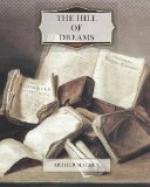“They are very nicely done,” said the parson; “but I’m afraid you won’t find anybody to print them, my boy.”
So he pottered on; reading everything, imitating what struck his fancy, attempting the effect of the classic meters in English verse, trying his hand at a masque, a Restoration comedy, forming impossible plans for books which rarely got beyond half a dozen lines on a sheet of paper; beset with splendid fancies which refused to abide before the pen. But the vain joy of conception was not altogether vain, for it gave him some armor about his heart.
The months went by, monotonous, and sometimes blotted with despair. He wrote and planned and filled the waste-paper basket with hopeless efforts. Now and then he sent verses or prose articles to magazines, in pathetic ignorance of the trade. He felt the immense difficulty of the career of literature without clearly understanding it; the battle was happily in a mist, so that the host of the enemy, terribly arrayed, was to some extent hidden. Yet there was enough of difficulty to appall; from following the intricate course of little nameless brooks, from hushed twilight woods, from the vision of the mountains, and the breath of the great wind, passing from deep to deep, he would come home filled with thoughts and emotions, mystic fancies which he yearned to translate into the written word. And the result of the effort seemed always to be bathos! Wooden sentences, a portentous stilted style, obscurity, and awkwardness clogged the pen; it seemed impossible to win the great secret of language; the stars glittered only in the darkness, and vanished away in clearer light. The periods of despair were often long and heavy, the victories very few and trifling; night after night he sat writing after his father had knocked out his last pipe, filling a page with difficulty in an hour, and usually forced to thrust the stuff away in despair, and go unhappily to bed, conscious that after all his labor he had done nothing. And these were moments when the accustomed vision of the land alarmed him, and the wild domed hills and darkling woods seemed symbols of some terrible secret in the inner life of that stranger—himself. Sometimes when he was deep in his books and papers, sometimes on a lonely walk, sometimes amidst the tiresome chatter of Caermaen “society,” he would thrill with a sudden sense of awful hidden things, and there ran that quivering flame through his nerves that brought back the recollection of the matted thicket, and that earlier appearance of the bare black boughs enwrapped with flames. Indeed, though he avoided the solitary lane, and the sight of the sheer height, with its ring of oaks and molded mounds, the image of it grew more intense as the symbol of certain hints and suggestions. The exultant and insurgent flesh seemed to have its temple and castle within those olden walls, and he longed with all his heart to escape, to set himself free in the wilderness of London, and to be secure amidst the murmur of modern streets.




